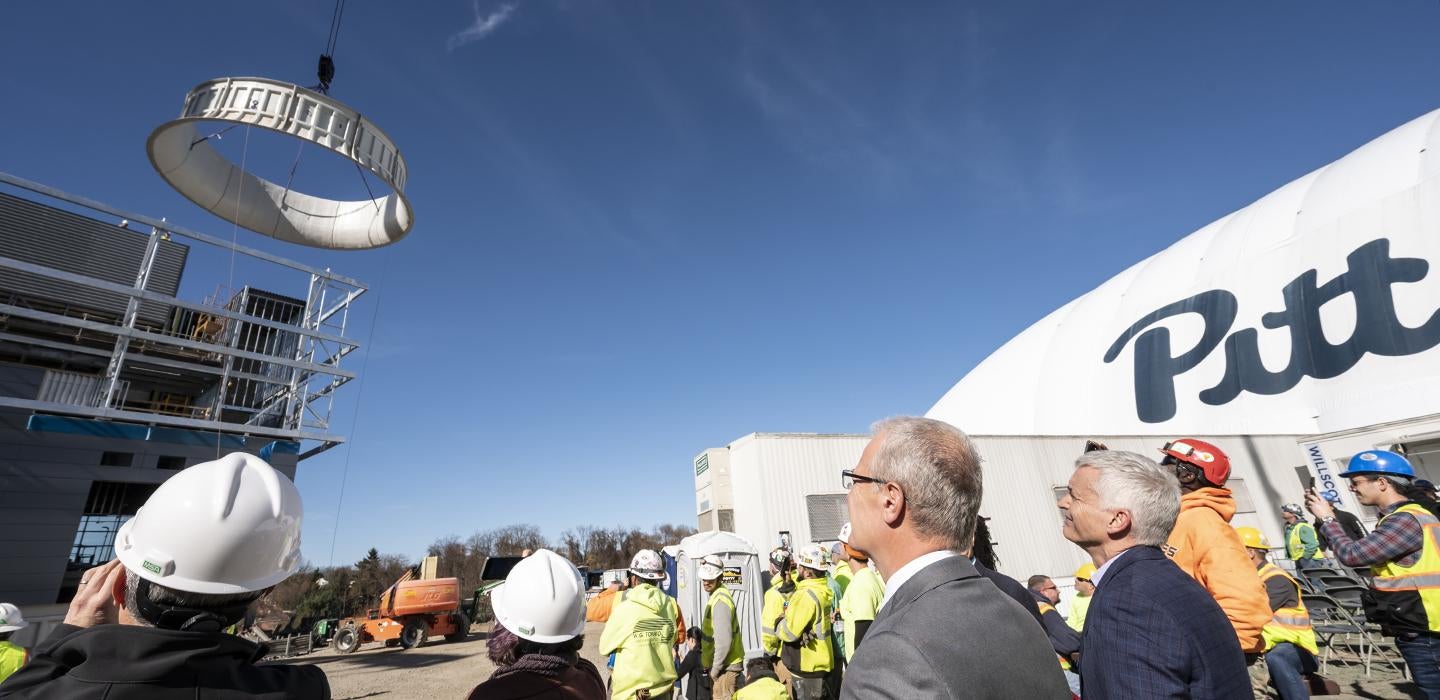
Subscribe to Pittwire Today
Get the most interesting and important stories from the University of Pittsburgh.On Nov. 8, the final section of the cooling tower for Pitt’s new chilled water plant was lifted into place as a crowd celebrated the achievement. This “topping off” ceremony signified a new stage of a project notable for its complexity and highlighted the tangible results of Pitt’s dedication to furthering sustainability initiatives as well as diversity, equity and inclusion across the University.
“This is an extremely important project for Pitt,” said Dave DeJong, senior vice chancellor for business and operations. “We are building capacity to make our infrastructure more resilient on the campus hillside, providing foundational strength to support the University’s current and future needs.”
The three-story, 45,000-square-foot building across from the Petersen Events Center contains three industrial chillers with a total capacity of 7,500 tons of chilled water and up to 15,000 tons if another three chillers are added. The project, expected to be completed in December 2023, also includes construction of a new electrical substation and other required infrastructure to support buildings throughout upper campus, with possibilities for future expansion.
Chilled water provides an efficient and sustainable means of temperature management for large spaces and play an important role in Pitt’s goal of carbon neutrality by 2037. The new plant will provide cooling for the upper campus hillside transformation that includes the Campus Recreation and Wellness Center and Victory Heights while adding important redundancy along with the three other chiller plants on the Pittsburgh campus.
Also included in the plant is a rainwater collection system that allows for the reuse of rainwater, saving money by minimizing potable water use while also reducing stormwater runoff flowing into the city’s combined sewer system.
Project partners include Turner and Mosites construction companies, along with Pitt’s Office of Engagement and Community Affairs and the Hill District Community Engagement Center. Executive Director of the Engaged Campus Jamie Ducar cited the success of extensive partnerships with the Hill District and local communities, including subcontractors, vendor supply partnerships and an apprenticeship program with a specific focus on the Hill District neighborhood.
“This project is a strong example of the way Pitt serves as an anchor institution,” said Ducar. “We’re leveraging our need for campus development to create additional employment and business opportunities for residents of our local communities.”
Pitt’s Office of Faculties Management also sought ways to diversify project teams as outlined in their diversity initiatives, resulting in 40% participation of minority- and women-owned businesses.
The crowd gathered on Pitt’s upper campus included designers that had the original vision for the plant along with the workers who brought the project to fruition. In addition to DeJong and Ducar, attendees also heard from Pitt Project Manager Pete Mastro, Vice Chancellor of Facilities Management Scott Bernotas and general manager for Turner Construction’s Pittsburgh office Drew Kerr.
“We are celebrating a building that is ready to go to our next group of skilled employees who will manage water and electricity installation and distribution,” said Pete Bianco, director of strategic planning for Mosites Construction. “We should all be really excited about what the future holds on this campus.”
— Patrick Monahan, photography by Aimee Obidzinski


